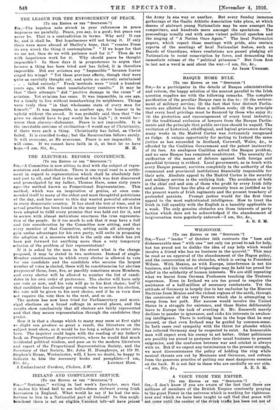THE LEAGUE FOR THE ENFORCEMENT OF PEACE. [To THE EDITOR
or THE " SPECTATOR."] FIR,—The hopeless note struck in your references to peace impresses me painfully. Peace, you say, is a good; but peace can never be. That is a contradiction in terms. Why note It can be, and it shall be. But hopelessness will not bring it. If only there were more abroad of Shelley's hope, that " creates From its own wreck the thing it contemplates." " If we hope for that we see not, then do we with patience wait for it." Then do we with impatience work for it. Why should peace be thought impossible ? In these days it is preposterous to argue that because a thing has been tried and has failed, it is therefore impossible. Did our aviators say " Impossible " because Icarus singed his wings?, " Yet these previous efforts, though they' were quite as carefully thought out, and quite as sincerely entertained . . . failed entirely." Fresh 'methods were "tried a hundred years ago, with the most unsatisfactory results." It may be that " their attempts " did " positive damage to the cause " of aviation. Yet aviation has come. It was impossible, in one age, for a family to live without tomahawking its neighbours. Things were truly then "In that wholesome state of every man for himself." It was impossible, in another age, for honour to be upheld without the sword. It was probably said then that " the price we should have to pay would be too high "; it would be— worse that slavery—dishonour. Peace is not impossible. It is the inevitable outcome of civilization—I would say of Christianity, if there were such a thing. Christianity has failed, as Christ failed. It is crucified to-day; but the Resurrection follows surely. It will overcome, as He overcame. Peace is not impossible. It will come. If we cannot have faith in it, at least let us have














































 Previous page
Previous page